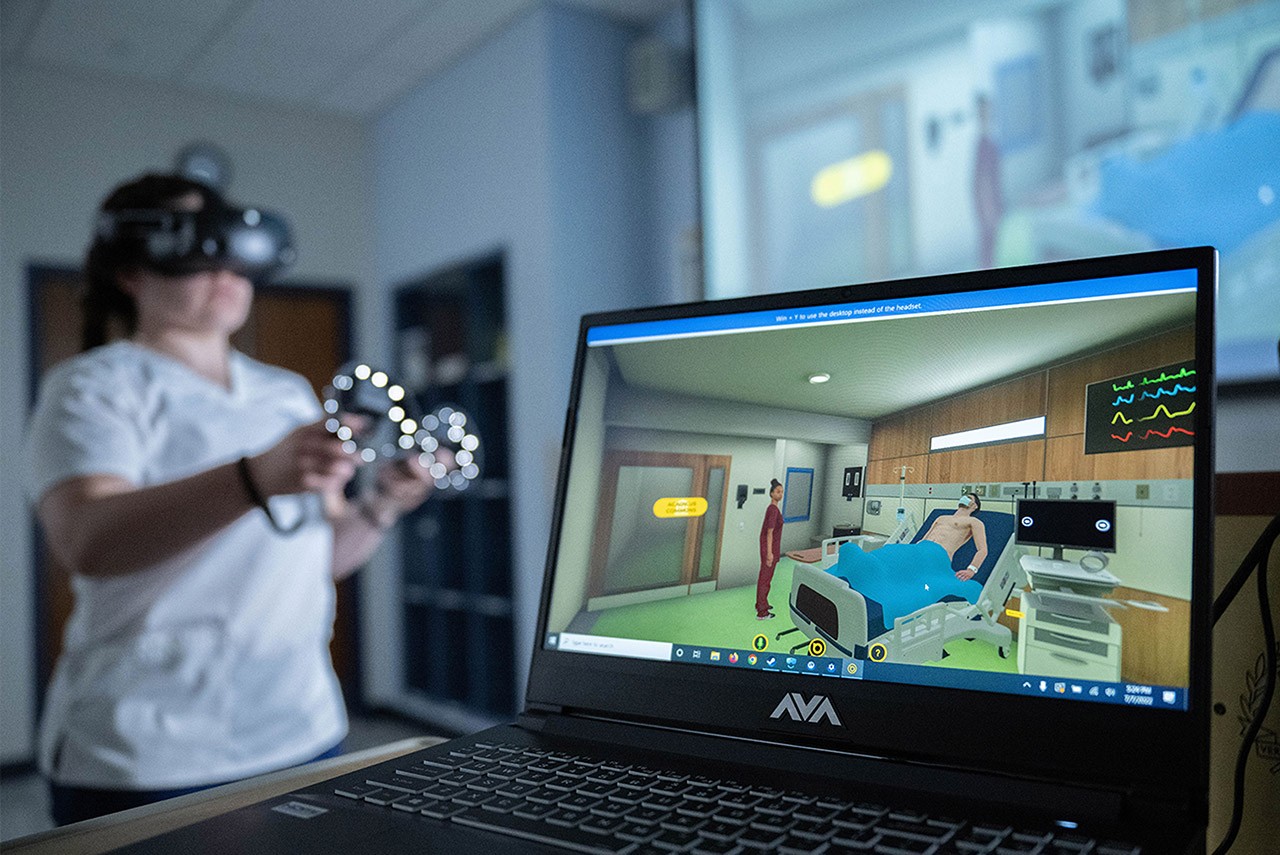Virtual Reality with a Real Impact
Simulation in Nursing education takes on a new dimension in the virtual world
By Valerie Neff Newitt

The experience of moving a wounded soldier into a helicopter while under enemy fire is one that will stay with Gail Furman, PhD, RN, CHSE—even though it was purely virtual. It happened during a visit to the Val G. Hemming Simulation Center at the Uniformed Services University of the Health Sciences in Silver Spring, Md., and for her, it solidified the power of immersive virtual reality (VR).
“The helicopter ride felt so real; I could see the ground moving from the window,” recalls Dr. Furman, clinical professor and executive director of the Simulation and Learning Resource Center at Villanova’s M. Louise Fitzpatrick College of Nursing. “Virtual reality is the future of simulation-based health care education.”
It’s exactly the sort of immersive experience that is coming to Villanova’s Simulation and Learning Resource Center under Dr. Furman’s guidance. The center is already equipped with commercially available products for VR—and now, Assistant Director Patricia Prieto, MBA, RN, CHSE, is working closely with a VR software company to develop custom 3D immersive scenarios.
“Students will be able to engage in realistic situations designed by Nursing faculty that can be modified as needed to increase learning,” Dr. Furman explains. These scenarios will include caring for patients with heart failure, working on a postoperative hip replacement surgery case and safely administering medication to a variety of patients. “I’m looking forward to incorporating this methodology into our teaching,” she says.
Low Risk, High Reward
Villanova’s 12,000-square-foot Simulation and Learning Resource Center boasts three examination rooms, a fully equipped operating room and 10 clinical simulation labs, all outfitted with audiovisual equipment for recording and playback.
“Simulation is a growing field,” Dr. Furman says. “A study conducted by the National Council of State Boards of Nursing found as much as half of clinical time can be supplemented with high-quality simulation, with no detectable difference in educational outcomes.”
Students work through scenarios in small groups and under the supervision of faculty who control the simulated events, pausing for reflection or correction so learners can benefit from each other’s successes and mistakes. These simulated scenarios also give Villanova Nursing students a real chance to collaborate with students from St. Joseph’s University (formerly University of the Sciences) and from Philadelphia College of Osteopathic Medicine who are studying other health care disciplines. “Nursing never exists in a silo,” says Ellie Latz, RN, ’22 FCN. “By interacting with those students, I came to understand what resources other health care providers offer in patient care, and where I could provide my expertise as a nurse.”
In addition to using highly sophisticated simulation manikins, Villanova Nursing students also interact with real people in some of these scenarios—standardized participants who are trained to portray patients, family members or health care professionals. As part of the Standardized Patients with Disability Program, the College recruits a number of patients with real conditions, ranging from cerebral palsy to amputation, preparing Villanova Nursing students to better care for individuals with disability once they’re in the field.
Most importantly, the Simulation and Learning Resource Center offers Villanova Nursing students a highly sophisticated training ground where they can refine their skills and make the transition from learning in the classroom to applying that knowledge in the clinical environment. “It can be life or death when dealing with real patients,” Latz says. “The center offers a place to learn without endangering anyone.”
In June, the center became one of the first schools endorsed by the International Nursing Association for Clinical Simulation and Learning’s inaugural Healthcare Simulation Standards endorsement program.
A New Era in Nursing Simulation
Dr. Furman envisions Villanova’s Simulation and Learning Resource Center becoming “an internationally recognized leader in simulation-based education and research for improving population health.”
This year, the center was selected to participate in a pilot program that will bring the M. Louise Fitzpatrick College of Nursing one step closer to realizing that vision. In June, the center became one of the first schools endorsed by the International Nursing Association for Clinical Simulation and Learning’s inaugural Healthcare Simulation Standards endorsement program.
Dr. Furman says those who came before her have laid the groundwork to make this possible. “I’m standing on the shoulders of giants—Villanova Nursing faculty members who are modern trailblazers.”
NEXT IN NOVA-WORTHY
Ricaurte Vásquez Morales, PhD, ’73 CLAS, is a distinguished economist and administrator of the Panama Canal